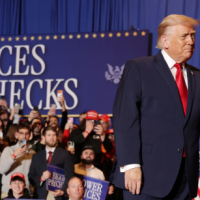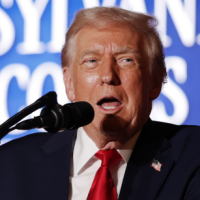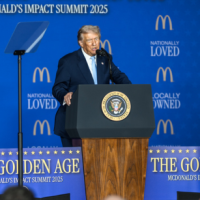Our annual recap of the worst falsehoods of the year.
Person: Donald Trump
FactChecking Trump’s Economic Speech
Trump Confirms His Disparaging Remark About ‘Shithole Countries’ at Immigration Meeting
Probing Trump’s Verbal Attack on Somalis
In a disparaging attack on Somalia in which he said he didn’t want people of Somali descent in the United States, President Donald Trump said Somalis “ripped off” Minnesota “every year” for “billions of dollars,” an apparent reference to a fraud investigation, and suggested that “like 88%” of Somalis receive “welfare” benefits. But the White House didn’t provide us with evidence for either of those figures.
Examining Trump’s Pardon of Former Honduran President Convicted of Trafficking Drugs to U.S.
Q&A on Vetting of Accused National Guard Shooter
In the aftermath of the deadly ambush shooting of two National Guard members in Washington, D.C., President Donald Trump and others in his administration immediately blamed Trump’s predecessor, Joe Biden, for failing to vet the Afghan national accused of the attack. Here, we’ll answer some questions about what we know so far about the suspect and the vetting process.
Sorting out the Facts on Epstein Claims
The House voted nearly unanimously on Nov. 18 to force the Department of Justice to release “all unclassified records, documents, communications, and investigative materials” related to the investigation and prosecution of Jeffrey Epstein. In the days before and after the bill passed, representatives from both parties hurled accusations against political opponents related to Epstein and the contents of some recently released documents.
Experts Say Democratic Video Not ‘Seditious,’ as Trump Claims
After six congressional Democrats released a video advising members of the U.S. military and national security community to “refuse illegal orders,” President Donald Trump said the lawmakers should be tried in court for “SEDITIOUS BEHAVIOR, punishable by DEATH!” But legal experts told us this was not sedition and that the legislators were restating the law that only lawful orders must be followed.
Trump Misrepresents Biden’s Job Numbers, SNAP Data to Tout His Own Record
Addressing a meeting of McDonald’s restaurant owners, President Donald Trump distorted his predecessor’s record on employment, falsely claiming that government jobs were increasing while “real jobs” were declining. The number of private-sector jobs increased every year under former President Joe Biden’s term and was up about 12% by the time he left office.
Trump at Odds with CIA Assessment on Khashoggi Killing
President Donald Trump brushed aside a reporter’s question to Saudi Crown Prince Mohammed bin Salman about the 2018 killing of Washington Post contributing columnist Jamal Khashoggi, saying the crown prince “knew nothing about it and we can leave it at that.” But Trump’s claim is at odds with a CIA assessment.









